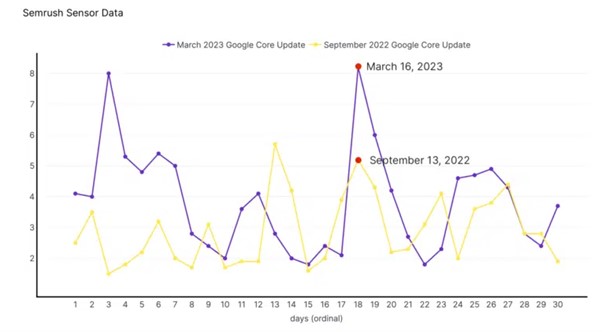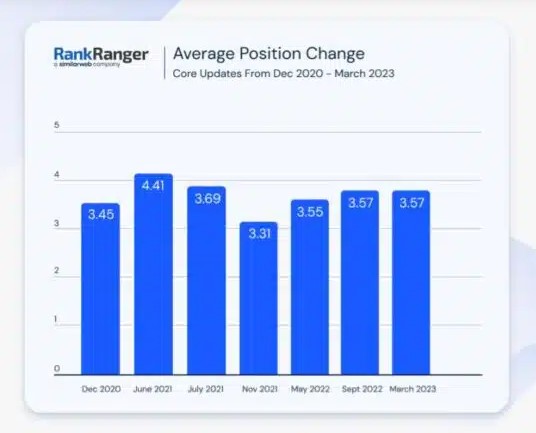Google has announced it has completed rolling out March 2023 core update. This update that started rolling out on March 15, 2023, took 13 days to complete on March 28, 2023. Reports consider this as a fairly impactful update compared to previous core updates.

Image source
Our previous blog highlighted a list of questions that Google has offered to consider, if your site is hit by a core update.
This update is reported to be quite a big one, and has caused a lot of ranking volatility across many verticals in the Google search results. Reports say that the March 2023 core update experienced significant volatility on March 16th, and then again on March 23rd/24th. This global update has impacted all regions, in all languages.
Impact of March 2023 Core Update
Search Engine Land discussed the volatility status of the March 2023 core update, provided by SemRush and RankRanger. SemRush said the March 2023 update was more volatile than the September 2022 core update, while RankRanger said it was about as volatile as that previous core update.
SemRush
SemRush’s Sensor data reported that the core update in March 2023 exhibited a higher level of volatility, reaching a peak of 8. In contrast, the September 2022 core update only reached a peak of around 5. The following chart displays the peak levels for both updates during their rollout period.
According to Mordy Oberstein from SemRush, “The volatility increases seen during the March 2023 Core Update relative to the pre-update baseline were 74% higher than what was recorded back in September. The March 2023 Core Update relative to the September 2022 Core Update – 8.7% of the top 10 results now ranking on the SERP previously ranked beyond position 20 prior to the update. Back in September, that number stood at 6.5%. Thus, the data again points to more significant rank fluctuations during the March update.”
When analyzed by vertical, SemRush data suggests that the impact of the March 2023 update is considerably greater than that of the September 2022 update.
RankRanger
After the rollout of the update began, the RankRanger Rank Risk Index displayed significant volatility on the following day. RankRanger then conducted a comparison of the March 2023 core update to all the previous core updates since December 2020, including the September 2022 core update. Despite being one of the most significant updates, the March 2023 core update exhibited a similar intensity level to the September 2022 core update.
According to Darrell Mordecai from RankRanger, “When we look at the average fluctuations for the March update, we see that it was one of the biggest updates topped only by the June 2021 update.”
When analyzing the top 3, top 5, and top 10 positions, the data revealed that the March 2023 update exhibited lower rank volatility than the September 2022 update in the top 5 positions. RankRanger data also assessed how the update impacted various verticals or niches, across the top 3, 5, and 10 organic Google search result placements.
Some other automated tracking tools that reported the changes include Accuranker, Advanced Web Rankings, SERPmetrics, Cognitive SEO, SERPwoo, Algoroo, Mozcast, and SERPstat.
Compared to other updates, a Google core update brings about substantial and comprehensive changes to the company’s search algorithm and systems. These updates are noteworthy because they have a noticeable impact on search results. Core algorithm updates have the potential to affect search rankings, which is why it is critical for website owners and SEOs to remain informed and adjust their strategies accordingly.
To maintain a strong presence in search results and prepare for future algorithm updates, web marketers and organic SEO companies must prioritize monitoring site metrics, creating high-quality content, enhancing the user experience, and optimizing technical aspects.
MedResponsive team is up-to-date with all the Google algorithm updates!
Get professional SEO services with us!
Talk to us at (800) 941-5527!






